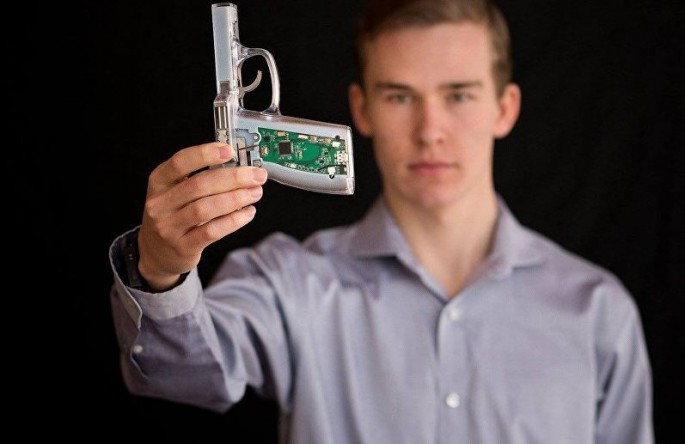A 19 year-old from Boulder, Colorado horrified by the relentless mass shootings in the U.S. has developed a prototype "smart gun" only its owner can fire and is looking for some $7 million to produce the weapon.
Kai Kloepfer, currently an undergraduate at MIT, was goaded into developing the smart pistol by the gun murders of 12 people in 2012 at the Aurora Theater just 35 miles from his home. His research, however, discovered that accidental shootings, suicides and firearms misuse actually killed more people in the U.S. every year than mass shootings.
The result of his concern and research is his version of a smart pistol that only fires when it identifies the fingerprint of its owner. To use the weapon, a gun owner has store and save his fingerprints in the gun's electronic circuitry. He can also save the fingerprints of other persons he decides can use the weapon.
When an authorized user grips the gun normally, the gun reads his fingerprint and compares it to a list of users stored inside the gun's electronic memory. If the fingerprint matches, the gun is ready for fire. If not, it remains locked and incapable of firing.
"When the owner picks it up, or somebody the owner has chosen, the gun will work for them," said Kloepfer.
"But if a child finds it, a teenager tries to use it to commit suicide, or even if ... an assailant disarms a police officer, then the gun is locked and unable to be used."
Kloepfer is raising money on Indiegogo to turn his transparent plastic prototype into a working firearm. He said he's selected a firm named VisionWorks Engineering in San Diego to make the real smart gun. VisonWorks is a contract design and engineering service company.
He said he needs $72,000 to design and build a prototype smart pistol; $150,000 to test it; $ 1 million to fully test the weapon and $5 million to manufacture the smart pistol.
Kloepfer explained he initially started developing non-functional prototypes using plastic bottles but over time and with the help of a small team and winning funding awards, he raised enough money to move forward.
"We have now reached working model stages and we will have a real firearm model with the 'smart' tech implemented ready by this week."



























